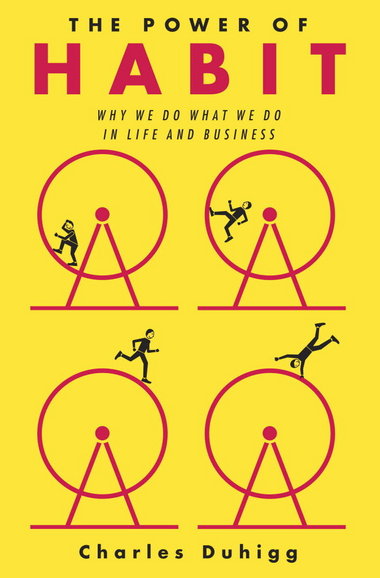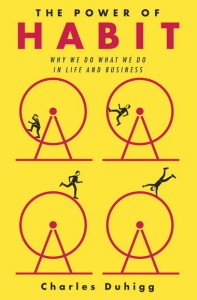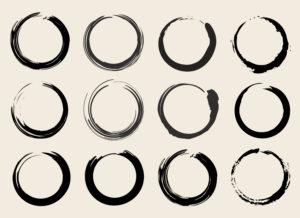Lately, I’ve developed a bad habit during my piano practice. About 15 minutes in, I glance over at my computer monitor, logged off, the screen a still black. My grand piano is in my home office, about five feet away from my desk and computer. Although I’ve been looking forward to this moment of progressing with my piano music all day, part of me wants to spring off the bench and check email. After 30 minutes of practice, I can’t help myself any longer. Before I know it, I’m ensnared in Gmail, precious practice minutes crumbling away.
I have developed during my piano practice what Charles Duhigg would call a bad habit. In The Power of Habit (Random House, 2012), Duhigg describes a bad habit of his own, wandering to the cafeteria at work every afternoon to gobble down a chocolate chip cookie, although he wasn’t particularly hungry. Despite his waist thickening and his wife complaining, he couldn’t muster the willpower to forgo the cookie.
Luckily, Duhigg’s research into brain science is applicable not only to how to create good habits for piano practice, but also how to squelch the bad ones. Breaking a bad habit entails first understanding the cue, the trigger that causes the brain to activate the habit, even if a person deplores that behavior. In my case, the cue was time-based, occurring about 30 minutes into my practice.
Secondly, probe the nature of the reward: what benefit is the determined brain seeking? In my case, what benefit did I get from checking email? I realized that I logged onto my computer not so much because I felt desperately behind with my inbox; I always feel that way, quite frankly. Rather, it was because piano practice with the likes of Scriabin, Schubert, and Chopin is intense. The reward in this case was simply a break, a treat I deprived myself of because it seemed so implausible in the face of how much I wanted to practice.
It turns out that Charles Duhigg was eating his chocolate chip cookie because he really wanted to socialize. Once he understood the cycle behind his habit, he was able to create a new routine, as I hope with my email habit. These days, if I glance over at the computer, I remind myself that at the 30-minute mark, I will be able to stretch my legs and walk around. When the time for my break comes, I toss in a load of laundry or water a few plants. That opportunity for a five-minute rest from the music’s intensity allows me to return refreshed.
This chart on Charles Duhigg’s website goes into greater detail on how to break a bad habit. The chart in turn is a good synopsis of the rich and complex science behind habits which Duhigg makes so accessible in his book. Sometimes lots of self-examination and inquiry is required to break the bad habit cycle. But when it comes to precious piano practice, the effort is worth it.





I need this! I have the same problem.
Harriet, I don’t think we’re alone!
Dear Nancy
I am a Harvard fellow from Brazil and a profound bi-lateral deaf since I was a child, I rely a lot on lip reading. I wear two superpower Resound Hearing Aids. I am trying to overcome some of these bad habits to improve my performance, to concentrate and to be able to play by memory
I have a baby grand Steinway piano at home in Rio and can play 3 Bach partitas (1,2 and 6) and the four Chopin ballades reasonably well, although making sometimes some mistakes.
I would love to meet you sometime!
Dear Cristina, I was very moved by your story–thank you for writing. Your repertoire sounds amazing. It’s so inspiring to learn about your dedication. I would love to meet you sometime too. I am delivering at workshop at the Hearing Loss Association of America conference this June if you happen to be Stateside then. Nancy
Dear Nancy,
Many thanks for your so friendly and kind reply! I was able to work on this difficult repertoire because I have in Rio a wonderful and outstanding piano teacher, Angela Schettino, who believed that I could make it in spite of my profound hearing loss. I have four classes a week with her, three hours and a half each, and although I can play now this repertoire reasonably well, I still rely mostly on reading. Probably because of my hearing loss since I was born, my auditory memory is not very good and I hope to find in your site some tips to develop it! I am not sure yet if I will be able to schedule in my job a trip to the conference and workshop in June, but I promise that I will do my best to be there! I am looking forward to meet you, I am amazed by your outstanding performance! All the best, Cristina
Dear Nancy,
What kind of workshop are you organizing in the HLAA Conference? Where it will be?
Best,
Cristina
I’ll be presenting a workshop on stigma at the conference. You can read more about the convention on the HLAA website and about my presentation here. http://www.nancymwilliams.com/events/
Many thanks, Nancy! I will read it.
All the best,
Cristina
Many thanks, Nancy!
All the best,
Cristina
Many thanks, Nancy! I will read it.
All the best,
Cristina